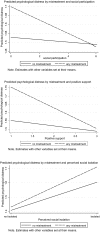Mistreatment and psychological well-being among older adults: exploring the role of psychosocial resources and deficits
- PMID: 21239415
- PMCID: PMC3041976
- DOI: 10.1093/geronb/gbq096
Mistreatment and psychological well-being among older adults: exploring the role of psychosocial resources and deficits
Abstract
Objectives: To examine the relationships between psychosocial resources and deficits, elder mistreatment, and psychological well-being.
Methods: We used a representative sample of 2,744 older adults aged 57-85 years in the United States from the National Social Life, Health and Aging Project. We examined reports of any mistreatment (verbal, financial, or physical) and multiple types of mistreatment.
Results: Lower levels of positive support, higher levels of criticism from close relationships, and feelings of social isolation are positively associated with self-reported mistreatment experience. As suggested by the stress process theory, those who reported mistreatment experience also reported lower levels of global happiness and higher levels of psychological distress. There is also some evidence for the buffering hypothesis--levels of global happiness are higher and levels of psychological distress are lower for older adults who reported any mistreatment if they also reported more positive social support, social participation, and feelings of social connection.
Discussion: Older adults with fewer psychosocial resources or more psychosocial deficits seem to be more vulnerable to mistreatment, and mistreatment seems particularly detrimental to psychological well-being for these people.
Figures



References
-
- Acierno R. Elder mistreatment: Epidemiological assessment. In: Bonnie RJ, Wallace RB, editors. Elder mistreatment: Abuse, neglect and exploitation in an aging America. Washington, DC: National Academies Press; 2003. pp. 261–302. - PubMed
-
- Acierno R, Hernandez MA, Amstadter AB, Resnick HS, Steve K, Muzzy W, Kilpatrick DG. Prevalence and correlates of emotional, physical, sexual, and financial abuse and potential neglect in the United States: The National Elder Mistreatment Study. American Journal of Public Health. 2010;100:292–297. - PMC - PubMed
-
- Berntson GG, Cacioppo JT. From homeostasis to allodynamic regulation. In: Cacioppo JT, Tassinary LG, Berntson GG, editors. Handbook of psychophysiology. Cambridge, UK: Cambridge University Press; 2000. pp. 459–481.
-
- Bonnie RJ, Wallace RB, editors. Elder mistreatment: Abuse, neglect and exploitation in an aging America. Washington, DC: National Academies Press; 2003. - PubMed
-
- Cacioppo JT, Hughes ME, Waite LJ, Hawkley LC, Thisted RA. Loneliness as a specific risk factor for depressive symptoms: Cross-sectional and longitudinal analyses. Psychology and Aging. 2006;21:140–151. - PubMed
Publication types
MeSH terms
Grants and funding
LinkOut - more resources
Full Text Sources
Medical
Research Materials

